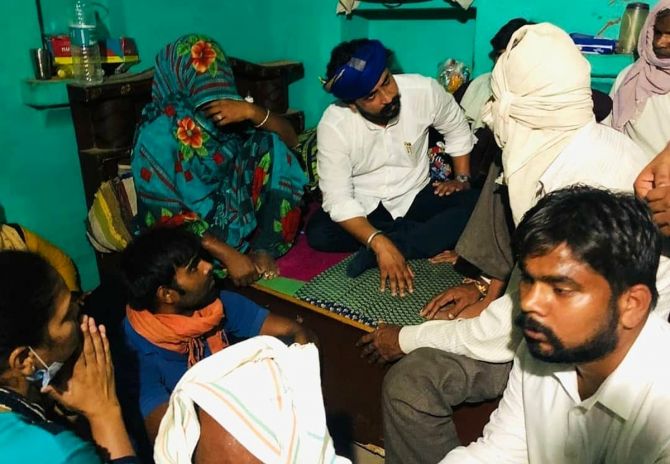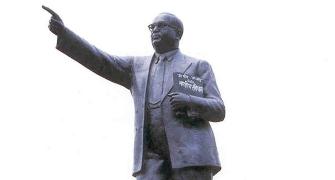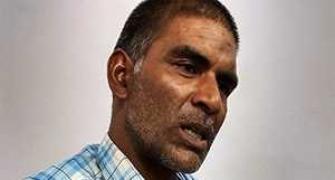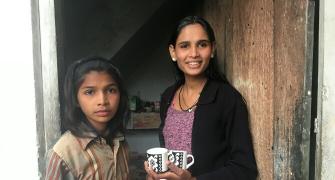'70 years back, Dalits used to be abused, scolded, slapped, but killing a Dalit was rare because a Dalit was somebody's property.'
'Now that they are free, they are facing violent attacks.'

"Every caste Hindu feels that the BJP has come to power too late to reverse the changes that have taken place in India in the last 70 years," Chandrabhan Prasad, a leading Dalit thinker, tells Rediff.com's Archana Masih.
As a longstanding observer of the Dalit situation in India, what is most shocking about the Hathras incident?
The Hathras atrocity cannot be seen in isolation. A similar horror has taken place in Balrampur near Gonda.
The frustration of the upper castes has reached unimaginable limits. The upper castes of India are highly frustrated and angry at this point of time. You can see that in the upper caste BJP spokesmen and television anchors, barring a couple of exceptions. They are always seething with anger.
The BJP came to power in 2014 and then in 2019, but caste Hindus feels the BJP has come to power too late to reverse the changes that have taken place in India in the last 70 years.
Since 1947, upper castes owned all institutions -- they owned land, government jobs, education, they were doctors, teachers, journalists and had a monopoly over everything.
The first break in that monopoly came when upper castes lost their land after zamindari was abolished. They lost monopoly over land and then in government jobs and then in the education sector.
The upper castes had reconciled with this changed situation, but the BJP's victory in 2014 gave them hope that they might be able to reverse the changes that have taken place.
But the victory in 2019 has actually not given them what they expected and hasn't brought the return of that old system. This has made them frustrated and angry.
The upper castes are frustrated that they have been let down by democracy in India.
Uttar Pradesh has an upper caste led-government for the first time since 2002.
This upper caste is a different upper caste. There are upper castes in the Congress, Communist parties and other parties too, but this upper castes thought the 2014 victory as a mandate for upper caste rule where there is a great recall of the past.
They had hoped that reservations would be ended and Dalits would return to work on their farms, but nothing like that has happened even after the repeat victory in 2019.
This acute anger and frustration has created a social upheaval in India.
What do you see as the reason for an increase in the attacks on Dalits during the lockdown?
The attack on migrants was an upper caste onslaught because it was assumed that migrants would be either Dalits or Muslims.
The apathy from the administration, the attack on them by the police, was an example of the frustration that the upper castes are undergoing.
Democracy has disenfranchised the upper castes. Even if they have a successful child who drives a Mercedes and lives in California, they rue the fact that they have lost their social status.
Blacks were not lynched in the US during slavery because they were somebody's slaves. They were owned by slave owners just like chickens or pigs.
On January 1, 1863, when Abraham Lincoln declared slavery illegal and Blacks became free, the lynching of Blacks in public places started.
When I speak to senior Dalits, I am told that 70 years back, Dalits used to be abused, scolded, slapped, but killing a Dalit was rare because a Dalit was somebody's property.
Now that they are free, they are facing violent attacks. There are parallels between what was experienced by the Blacks in US and the Dalits.
You have earlier said that Dalit youth are going through a jeans-t-shirt revolution, a dress code that is caste neutral, while earlier Dalits were not even allowed to wear a dhoti till their ankles. Is there a reaction to the changing status of Dalits?
India is undergoing a counter-revolution. Upper castes are seething in anger that society is not reversing to their choice.
Despite the presence of Mayawati, Dalits chose to support Narendra Modi post 2014. Do you think Dalits will move away from the BJP due to increased violence against them?
Where is the proof that Dalits supported Modi? There is only 1% decline in Mayawati's vote. This is propaganda by the BJP.
What impact is the Hathras tragedy going to have when Dalits cast their votes next time?
Anti-Muslim rhetoric has outlived its shelf life. Now anti-Dalit actions will be used to polarise society between Dalits and non-Dalits and it will benefit the BJP.
The BJP wants to be seen as an anti-Dalit party so that the rest of society goes with the BJP.
Do you feel Mayawati has ceased to be an activist leader of the Dalits?
Mayawati is living a retired life, I think.
Will Chandrashekhar Azad of the Bhim Army be the new leader of Dalits in UP?
He is evolving into that.
Has the thinking become more casteist in UP under the current state leadership?
That is why he (Uttar Pradesh Chief Minister Ajay Singh Bisht aka Yogi Adityanath) was brought in. He was brought to assure the upper castes that your raj has come.
How do you see these protests in the days to come? Will it help in bringing justice to the victim?
What Blacks faced in America Dalits will face in India.
That is a very depressing thought.
Every counter-revolution has depressing moments.
What is the way forward?
The only hope for Dalits is to capture English language and Mathematics and create their own economy.
The only way to discipline upper castes is for Dalits to become their employers.









